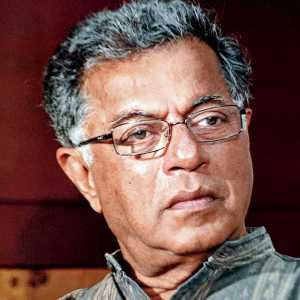Girish Karnad (19 May 1938 – 10 June 2019) was an Indian actor, film director, Kannada writer, playwright and a Jnanpith awardee, who predominantly worked in South Indian cinema and Bollywood. His rise as a playwright in the 1960s marked the coming of age of modern Indian playwriting in Kannada, just as Badal Sarkar did in Bengali, Vijay Tendulkar in Marathi, and Mohan Rakesh in Hindi. He was a recipient of the 1998 Jnanpith Award, the highest literary honour conferred in India.
For four decades Karnad composed plays, often using history and mythology to tackle contemporary issues. He translated his plays into English and received acclaim. His plays have been translated into some Indian languages and directed by directors like Ebrahim Alkazi, B. V. Karanth, Alyque Padamsee, Prasanna, Arvind Gaur, Satyadev Dubey, Vijaya Mehta, Shyamanand Jalan, Amal Allanaa and Zafer Mohiuddin.
He was active in the world of Indian cinema working as an actor, director and screenwriter, in Hindi and Kannada cinema, and has earned awards.
He was conferred Padma Shri and Padma Bhushan by the Government of India and won four Filmfare Awards, of which three are Filmfare Award for Best Director – Kannada and the fourth a Filmfare Best Screenplay Award. He was a presenter for a weekly science magazine programme called "Turning Point" that aired on Doordarshan in 1991.
Early life and education
Girish Karnad was born in Chitrapur Saraswat Brahmin family of Matheran, in present-day Maharashtra, in 1938. His mother Krishnabai (née Mankikar) was a young widow with a son who belonged to a poor family. Since it was necessary for her to earn a living, she began working as a nurse and cook (general housekeeper) for the bedridden wife of a certain Raghunath Karnad, a doctor in the Bombay Medical Services. He was from the Konkani speaking Chitrapur Saraswat Brahmin community.
Some five years later, and while the first wife was still alive, Krishnabai and Dr. Raghunath Karnad were married in a private ceremony. The marriage was controversial not because of bigamy (it was legal until 1956 for a Hindu man to have more than one wife) but because of the prevailing social prejudice against widow remarriage. Therefore, the wedding was held privately, and under the dispensation of the Arya Samaj, a reform organization that condones widow remarriage. Girish was the third of the four children born thereafter.
Karnad's initial schooling was in Marathi. Later, after his father was transferred to Sirsi in the Kannada-speaking regions of Bombay Presidency, Karnad was exposed to travelling theatre groups and nataka mandalis (theatre troupes), which were experiencing a period of efflorescence during the iconic Balgandharva era . As a youngster, he was an ardent admirer of Yakshagana and the theater in his village. His family moved to Dharwad in Karnataka when he was fourteen, where he grew up with his two sisters and a niece.
He earned his Bachelor of Arts degree in mathematics and statistics from Karnataka Arts College, Dharwad (Karnataka University), in 1958. After graduation, he went to England and studied Philosophy, Politics and Economics at Magdalen in Oxford as a Rhodes Scholar (1960–63), earning his Master of Arts degree in philosophy, political science and economics. Karnad was elected the President of the Oxford Union in 1962–63.
